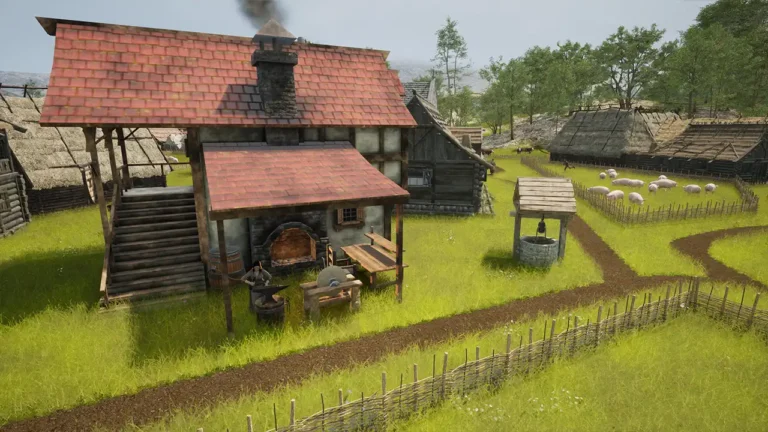In the 13th century, life was characterized by hardship, danger and the constant struggle for survival. Bastide, developed and published by MedievalNexus, takes players back to this harsh era and challenges them to develop a small farming village into a thriving, fortified town. But the path to this goal is peppered with challenges that require strategic skill and foresighted planning.
Creating a village out of nothing
The entry into Bastide begins with a handful of farmers and limited resources. The first shelters need to be built to enable further influxes, and the Basic supply to ensure that. Various professions are available: Lumberjacks cut down trees, hunters supply the village with meat and furs, while gatherers search for berries and herbs.

The variety of production chains is particularly remarkable. For example, wheat can be grown, processed into flour and finally baked into bread. Flax is used to make clothing, which is essential for survival in the cold months. These clearly structured processes make it easy to get started and enable the village to be managed efficiently.
Bastide brings Seasons and day-night cycle
Bastide impresses with a dynamic weather and season system as well as a realistic day/night cycle. These elements not only influence the aesthetics of the game, but also have a direct impact on the gameplay. In the Winter crops do not grow, and without sufficient supplies of food and firewood, there is a risk of starvation. Diseases can also break out if hygienic conditions are neglected.

The villagers react authentically to these conditions. At night they seek shelter in their houses, while during the day they go about their assigned work. It is interesting to note that they have individual needs and characteristics, which gives the game additional strategic depth.
Defense against external threats
In addition to the natural challenges, players also have to hold their own against external enemies. Bandit attacks are not uncommon and can cause considerable damage. It is therefore essential to build defenses such as walls and watchtowers early on and set up a militia.
The battles themselves are kept rudimentary, which is in keeping with the game's focus on building and managing the settlement. Nevertheless, these threats bring an additional level of tension to the game and require a balanced distribution of resources between Economy and military.
Technical implementation: light and shadow
Graphically presents itself Bastide and successfully captures the medieval atmosphere. The landscapes are richly detailed and the buildings convey an authentic flair. However, some players report performance problems, especially in bad weather and in larger settlements.

The Soundtrack remains discreetly in the background and provides an atmospheric backdrop to the action. The sound effects, such as the felling of trees or the hammering when building a house, contribute to the immersion, but could be expanded in terms of variety.
Development status of Bastide and community feedback
As an Early Access title Bastide is still under development. However, the developer is committed and regularly releases updates that add new content and fix existing problems. The community is actively involved in the development process and feedback is taken seriously.

Nevertheless, there are still a few issues. Bugs, such as problems with farming or awkward building placements, occasionally spoil the gaming experience. The balance between food production and population growth also needs some fine-tuning.
Medieval urban development with potential
Bastide offers a solid foundation for fans of building strategy games with a historical setting. The combination of resource management, Production chains and defense strategies makes for varied gameplay.
However, those interested should keep the early access status in mind and expect occasional shortcomings. However, those who are prepared to overlook minor shortcomings and actively support the development will be rewarded with a promising title that has the potential to become a real genre highlight.
